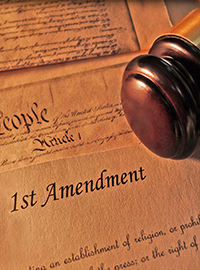| Important Supreme Court Win for 1st Amendment Over Cancel Culture |
 |
|
By Timothy H. Lee
Thursday, July 15 2021 |
Finally. Amid a deepening “Cancel Culture” environment of cyberstalking, harassment and outright persecution on the basis of political differences, the United States Supreme Court put its foot down in defense of the First Amendment. In a pivotal 6-3 ruling, the Court affirmed that when governments force mission-based organizations to disclose the identities, names, addresses and other sensitive information on their donors, that loss of anonymity can impermissibly chill the First Amendment rights of those organizations and their individual supporters. By forcibly “outing” supporters in that way, governments render them less likely to contribute and also subject them to the risk of reprisals. A unanimous Supreme Court reached that same conclusion in NAACP v. Alabama (1958), when it rejected an effort by Alabama officials to force the NAACP to surrender its membership lists. In subsequent decades, however, courts had allowed government intrusions to erode that First Amendment protection. At issue in Americans for Prosperity Foundation v. Bonta was a California law requiring charitable organizations in the state to register with the state Attorney General’s Office each year, and to disclose the identities of their major donors. Charities renewing their registrations were required to file copies of their federal Internal Revenue Service Form 990, on which tax-exempt organizations provide information about their missions, leadership and finances. Organizations must also disclose the names and addresses of their major donors. Since 2001, the plaintiffs in the case renewed their registrations as required, but protected their donors’ anonymity by declining to disclose their identities. Those organizations faced no consequences for non-compliance until 2010, the year in which Kamala Harris was elected Attorney General. In subsequent years, however, California increased its enforcement of the charities’ compulsory donor disclosure obligations under the law, ultimately threatening them with suspension of their registrations and fines for non-compliance. The plaintiff organizations therefore filed suit in federal court, rightly contending that compulsory disclosure violated their First Amendment rights and the rights of their donors by making them less likely to contribute and participate in the organizations’ missions. California rationalized that it needed to collect the information at issue to police misconduct and prevent fraud, but the Court was having none of it: Recall that 60,000 charities renew their registrations each year, and nearly all are required to fill a Schedule B. Each Schedule B, in turn, contains information about a charity’s top donors – a small handful of individuals in some cases, but hundreds in others. This information includes donors’ names and the total contributions they have made to the charity, as well as their addresses. Given the amount and sensitivity of this information harvested by the State, one would expect Schedule B collection to form an integral part of California’s fraud detection efforts. It does not. To the contrary, the record amply supports the District Court’s finding that there was not a single, concrete instance in which pre-investigation collection of a Schedule B did anything to advance the Attorney General’s investigative, regulatory, or enforcement efforts. Accordingly, the Court ruled, “California casts a dragnet for sensitive donor information from tens of thousands of charities each year, even though that information will become relevant in only a small number of cases involving filed complaints. The majority continued, “California does not rely on Schedule Bs to initiate investigations, and in all events, there are multiple alternative mechanisms through which the Attorney General can obtain Schedule B information after initiating an investigation.” Moreover, the Court highlighted, California proved itself utterly inept at protecting the sensitive organizational and donor information that it collected: The District Court also found that California was unable to ensure the confidentiality of donors’ information. During the course of litigation, the Foundation identified nearly 2,000 confidential Schedule Bs that had been inadvertently posted to the Attorney General’s website, including dozens that were found the day before trial. One of the Foundation’s expert witnesses also discovered that he was able to access hundreds of thousands of confidential documents on the website simply by changing a digit in the URL. The court found after trial that “the amount of careless mistakes made by the Attorney General’s Registry is shocking.” The Court further found that the plaintiffs showed that they and their supporters had been subjected to such things as bomb threats, protests, stalking and physical violence. “Such risks are heightened,” the Court noted, “in the 21st century and seem to grow with each passing year, as ‘anyone with access to a computer can compile a wealth of information about’ anyone else, including such sensitive details as a person’s home address or the school attended by his children.” Accordingly, the Court rightly determined that the First Amendment’s protections are triggered not only by explicit, outright legal restrictions on citizens’ or organizations’ individual freedoms of speech or association. Rather, “[t]he risk of a chilling effect on association is enough, because First Amendment freedoms need breathing space to survive.” The Supreme Court thus notched an invaluable victory for the First Amendment, once again highlighting the importance of judicial composition in this era of increasing partisanship and acrimony. Hopefully there are more to come. |
Related Articles : |
























